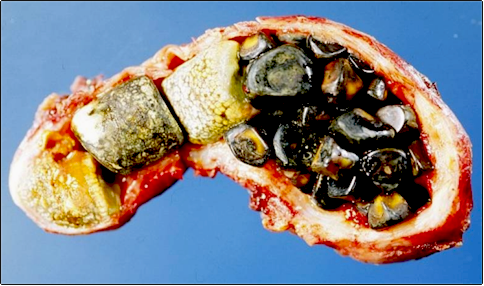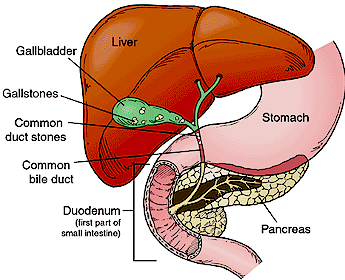Causes of Gallstones

Researchers believe that gallstones may be caused by a combination of factors, including inherited body chemistry, body weight, gallbladder motility (movement), and perhaps diet. Additionally, people with erythropoietic protoporphyria (EPP) are at increased risk to develop gallstones. Cholesterol gallstones develop when bile contains too much cholesterol and not enough bile salts. Besides a high concentration of cholesterol, two other factors seem to be important in causing gallstones. The first is how often and how well the gallbladder contracts; incomplete and infrequent emptying of the gallbladder may cause the bile to become over concentrated and contribute to gallstone formation. The second factor is the presence of proteins in the liver and bile that either promote or inhibit cholesterol crystallization into gallstones.

In addition, increased levels of the hormone estrogen as a result of pregnancy, hormone therapy, or the use of combined (estrogen-containing) forms of hormonal contraception, may increase cholesterol levels in bile and also decrease gallbladder movement, resulting in gallstone formation. No clear relationship has been proven between diet and gallstone formation. However, low-fibre, high cholesterol diets, and diets high in starchy foods have been suggested as contributing to gallstone formation. Other nutritional factors that may increase risk of gallstones include rapid weight loss, constipation, eating fewer meals per day, eating less fish, and low intakes of the nutrients folate, magnesium, calcium, and vitamin C.
On the other hand, wine and whole grain bread may decrease the risk of gallstones. The common mnemonic for gallstone risk factors refer to the "four F's", fat, an age near or above 40, female, and fertile, a fifth F, fair is sometimes added to indicate that the condition is more prevalent in Caucasians.
more about what causes Gallstones...

Many things can contribute to the development of gallstones. Factors that increases the risk factors for the development of gallstones include: Ethnicity - American Indians have a much higher risk. Obesity - It is increasingly common for younger people to suffer from symptoms of gallstones - this is in part due to the obesity epidemic. Pregnancy(this is why women tend to get gallstones more than men). Diet - high energy, high fat and low fibre. Resection of the terminal ileum, jejunal-ileal bypass surgery for obesity treatment, gastric surgery, treatment with TPN(total parenteral nutrition). Infection of the biliary tree especially by parasites - this is an important cause of pigmented gallstones in the East(eg China, Hong Kong). Diabetes mellitus, hyperlipidaemia, Crohn's disease, Haemolytic anaemia such as thalassaemia, hereditary spherocytosis and sickle-cell anaemia. Family history - one's risk of developing gallstones would be doubled if one has a first-degree relative with gallstones

Researchers from Kaiser Permanents reported in the Journal of Pediatric Gastroenterology & Nutrition (August 2012 issue), Obese children have a considerably higher risk of developing gallstones, compared to kids of normal weight. Overweight/obese people, especially women. A study revealed that a bulging midriff almost doubles a woman's chances of developing gallstones and the need for surgery to remove them.



